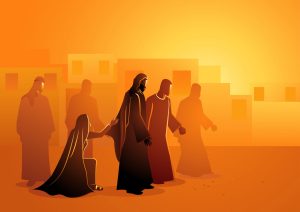
13th Sunday of Ordinary Time – Healing for All
Mark 5:21-43 | 13th Sunday of Ordinary Time, Year B
Healing for All
The stories of Jairius’s daughter and the hemorrhaging woman in Mark underscore the availability of Jesus’s healing to all.
A well-off synagogue official, Jairus was at the end of his rope. His much-loved daughter was “at the point of death” (v. 23). Jairus had the freedom to approach Jesus to ask Him to “lay hands” on his sick child. Hearing of Jairus’s plight, Jesus headed out with him, and Jairus, whom medicine had been unable to help, must have felt a measure of relief. If anyone could heal his daughter, it was this Man. Jairus probably wove through the crowds pretty quickly, his last hope now beside him. Not much was going to keep him from getting home. Until the hemorrhaging woman intervened.
A societal outcast without the protection of a male, the woman was aware of her place and didn’t ask Jesus to acknowledge her. She merely wanted to touch His robe. Doctors had caused her to “suffer greatly” (v. 26) as they had either tried in vain to heal her or ignored her plight and took her money. Now broke, she, like Jairus, was at the end of her rope. She had nothing to lose so reached for His garment.
Yet, when her fingers touched it, Jesus gave her His full attention. While Jairus stood there, likely irritated at the intrusion, and probably near despair, Jesus claimed the frightened woman as family, “Daughter, your faith has saved you. Go in peace and be cured of your affliction” (v. 34). The woman must have floated away. Not only was her affliction gone, but she had been noticed, claimed her, and been deemed worthy.
Meanwhile, Jairus received the news that His daughter had died. He must have been crushed. He was so close to having Jesus there, and yet…so far. But his companion was Jesus, so the story wasn’t over. And, of course, Jesus followed through, and Jairus’s daughter “arose immediately and walked” (v.42).
In these two stories, Jesus helped both the powerless (the woman and a child) and the powerful (Jairus). He helped the overtly religious and one about whom nothing is mentioned of her religion. For both patients, their acknowledgement of their faith and willingness to step out in that faith made them Jesus’s daughters, His family. Jairus believed, asked for help, and received it. The woman believed too and even without words, acted on that faith, and Jesus also helped her. Even more importantly, with His attention, Jesus recognized her humanity.
Do we have the courage to claim the spot on Jesus’s family tree? He wants to put our name there—but it’s up to us to ask for what we need in true faith.


